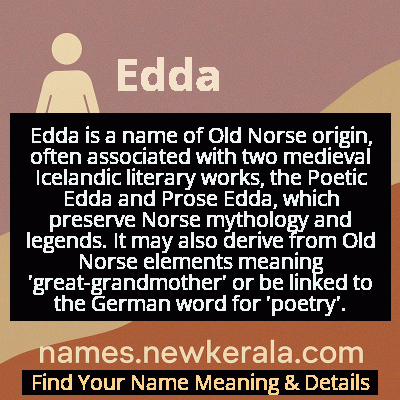Edda Name Meaning & Details
Origin, Popularity, Numerology Analysis & Name Meaning of Edda
Discover the origin, meaning, and cultural significance of the name EDDA. Delve into its historical roots and explore the lasting impact it has had on communities and traditions.
Name
Edda
Gender
Female
Origin
German
Lucky Number
5
Meaning of the Name - Edda
Edda is a name of Old Norse origin, often associated with two medieval Icelandic literary works, the Poetic Edda and Prose Edda, which preserve Norse mythology and legends. It may also derive from Old Norse elements meaning 'great-grandmother' or be linked to the German word for 'poetry'.
Edda - Complete Numerology Analysis
Your Numerology Number
Based on Pythagorean Numerology System
Ruling Planet
Mercury
Positive Nature
Adventurous, dynamic, curious, and social.
Negative Traits
Restless, impatient, inconsistent, prone to indulgence.
Lucky Colours
Green, white.
Lucky Days
Wednesday.
Lucky Stones
Emerald.
Harmony Numbers
1, 3, 9.
Best Suited Professions
Sales, marketing, travel, entertainment.
What People Like About You
Versatility, charisma, adventurous spirit.
Famous People Named Edda
Edda Mussolini
Journalist and Cultural Figure
Italian journalist and daughter of Benito Mussolini, known for her cultural influence and writings
Edda van Heemstra Hepburn-Ruston
Nobility
Mother of actress Audrey Hepburn, from Dutch aristocratic background
Edda Göring
Historical Figure
Daughter of Nazi leader Hermann Göring, whose life became part of post-war German history
Edda Magnason
Singer and Actress
Swedish jazz singer and actress known for her musical performances and film roles
Name Variations & International Equivalents
Click on blue names to explore their detailed meanings. Gray names with will be available soon.
Cultural & Historical Significance
In Germanic cultures, Edda represents a connection to ancestral knowledge and poetic tradition. The name gained particular prominence in 20th century Germany and Scandinavia, often chosen by families wanting to honor their cultural heritage and literary traditions. During the romantic nationalism movements, the name saw increased usage as Europeans looked to their medieval past for cultural identity. The name embodies a bridge between ancient mythology and modern identity, carrying the weight of centuries of storytelling and cultural preservation while remaining accessible and pleasant in contemporary contexts.
Extended Personality Analysis
Individuals named Edda are often perceived as intelligent, creative, and deeply connected to their heritage. They typically exhibit strong analytical abilities combined with artistic sensibilities, making them excellent problem-solvers with unique perspectives. Eddas tend to be thoughtful and introspective, valuing knowledge and cultural traditions. Their connection to the name's literary roots often manifests in strong communication skills and appreciation for language and storytelling.
Many Eddas demonstrate resilience and inner strength, characteristics that may stem from the name's association with ancient wisdom and survival through generations. They are often seen as reliable and trustworthy, with a calm demeanor that masks considerable depth and complexity. The combination of historical weight and pleasant sound creates individuals who balance tradition with modernity, making them both grounded and forward-thinking. Eddas typically approach life with a sense of purpose and cultural responsibility, often becoming custodians of family stories and traditions while embracing contemporary opportunities.
Modern Usage & Popularity
In contemporary times, Edda maintains a steady presence as a distinctive yet accessible name choice. While never reaching top popularity charts, it enjoys consistent usage particularly in Germany, Scandinavia, and among families with Norse heritage. The name has seen a mild resurgence in recent years as part of the trend toward vintage and mythological names. In Germany, it ranks around position 300-400 in popularity charts, making it uncommon but recognizable. The name appeals to parents seeking something traditional yet uncommon, with strong cultural roots. Modern Eddas often appreciate their name's uniqueness and historical significance, though some may find themselves explaining its origins. The name works well internationally due to its simple pronunciation and spelling, making it a practical choice for globally-minded families while maintaining its Germanic identity. Its pleasant sound and literary connections make it particularly appealing to educated, culturally-aware parents.
Symbolic & Spiritual Meanings
Symbolically, Edda represents the preservation of wisdom, cultural continuity, and the power of storytelling. The name embodies the concept of ancestral knowledge being passed through generations, much like the ancient texts it references. It symbolizes the bridge between past and present, carrying forward traditions while adapting to modern contexts. Metaphorically, Edda represents the idea that stories and names hold power beyond their immediate meaning—they connect us to larger cultural narratives and historical consciousness. The name also symbolizes resilience, as the Edda texts survived centuries to become foundational to our understanding of Norse culture. In a broader sense, Edda represents the feminine aspect of wisdom preservation, the 'great grandmother' archetype who safeguards family and cultural stories. It's a name that speaks to the enduring power of language and memory in shaping identity across time, serving as a reminder that our personal stories are part of larger historical and cultural narratives.

